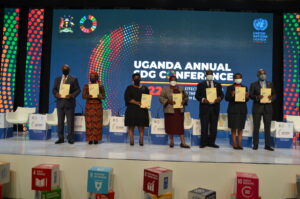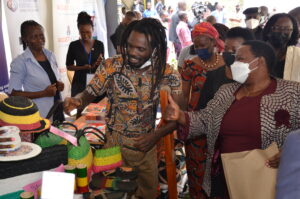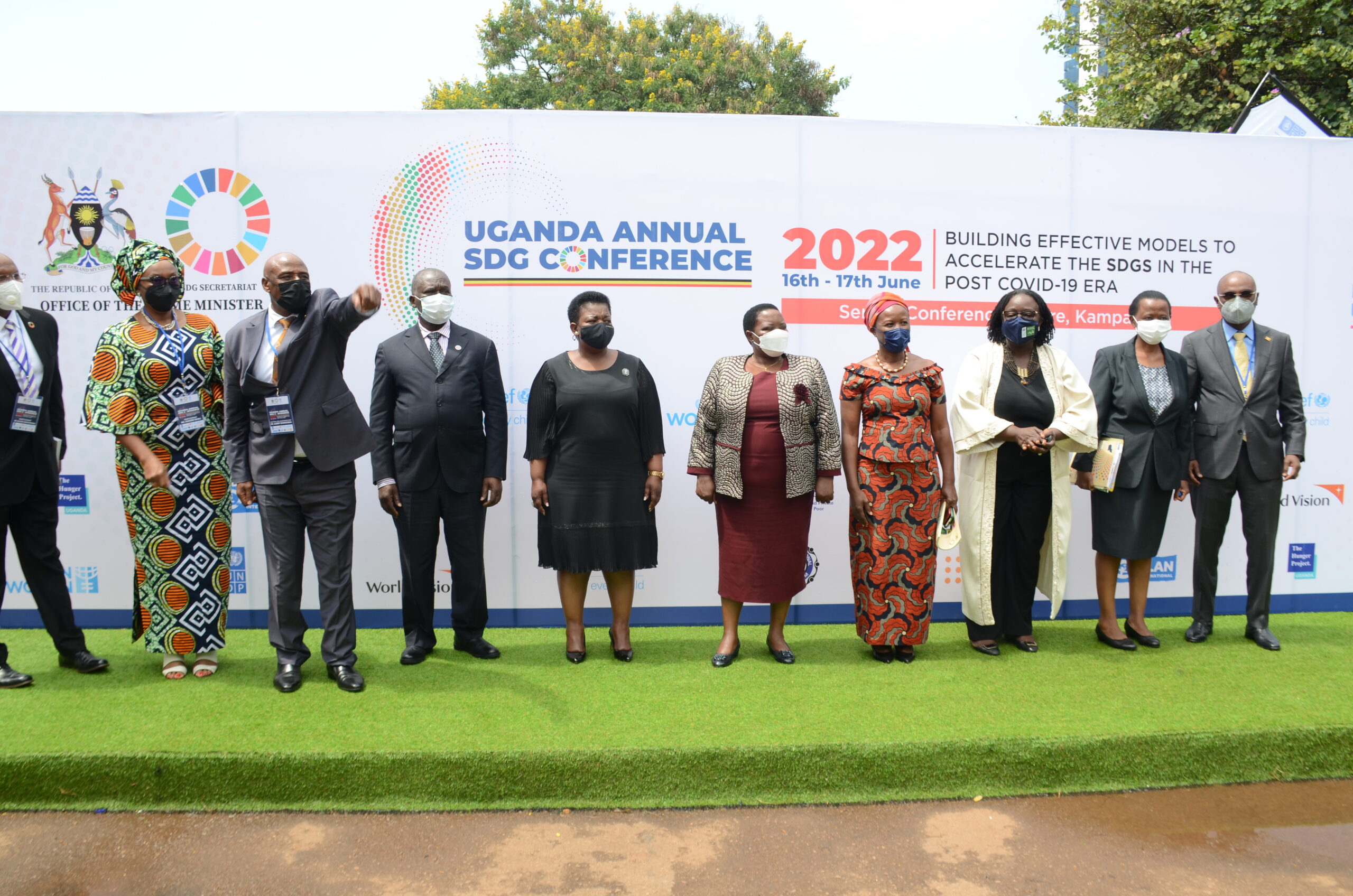By: Ismael Kasooha
KAMPALA
In 2015, world leaders adopted the 17 sustainable development goals (SDGs) to be attained by 2030.
In a report released on Thursday by the Office of the prime minister it is clear that Uganda has made tremendous achievements on all the 17 SDGs and is on course for further milestones.

R-L, The UN Resident coordinator Susan Namondo, the Prime Minister of Uganda Rt. Hon. Nabbanja Robinah and Justine Kasule Lumumba, the General Duties Minister in the Office of the Prime Minister
During the first annual National SDG Conference held at Serena conference center in Kampala, the prime minister of Uganda Rt. Hon. Nabbanja Robinah said that the implementation of SDGs is an important undertaking of the NRM Government, not just because the Goals and Targets were arrived at the UN in New York, but because this is an effort this Government has always prioritized.
“As you know, when the 69th Session of the UN General Assembly adopted the Agenda 2030, Uganda was the Chair of that session. We therefore hold SDGs special in our agenda,” said Nabbanja.
Nabbanja had represented President Yoweri Museveni at the launch of the report.
She said that the leadership in the country is therefore unshaken in ensuring the country attains the set targets and goals.
“We are committed to ensuring that we deliver sustainable development to our people. As the National Resistance Movement, this position is consistent with the commitments we made to the people of Uganda in our NRM Manifesto,’ said Nabbanja.
The premier said that the NRM Manifesto selected five priority areas of focus that include: Creating Wealth and Jobs; Delivering Education and Health; Ensuring Justice and Equity; Protecting Life and Property and Achieving Economic and Political Integration and these five priority areas are linked to all the SDGs.
“Within government we have also gone ahead and fully integrated the SDGs in Uganda’s National Development Plan. Currently, – the NDP III is now 90% aligned to the SDGs. We shall continue to work towards attaining all the targets set out in our National Development Plan, the Sustainable Development Goals as well as the NRM Manifesto,” said Nabbanja.
The prime minister said that as a country we have put in place the necessary institutional and policy framework to support the SDG implementation.
“The Office of the Prime Minister oversees Government business including SDG implementation. We put in place a national roadmap for implementation of the SDGs. We also appointed a focal point Minister for SDGs (Rt. Hon. Justine Kasule Lumumba). All these efforts are geared toward ensuring that the SDGs are fully localized and domesticated,” said Nabbanja.
She reiterated that this conference is, therefore, a step in the right direction as an effort to bring together a diversity of stakeholders in the SDG implementation process and clearly supports the fast-tracking of SDGs and creates an important policy dialogue opportunity for reviewing the progress towards the attainment of SDGs in Uganda.
Nabbanja added that as mentioned in the recent State of the National Address by His Excellency the President and in the Budget Speech, Uganda has attained the lower middle income status with a GDP Per Capita of USD $ 1,046 slightly higher than the entrance points for the lower middle-income status of USD 1,036.
“But while we can celebrate this achievement, it also requires us to work harder and sustain the current level of GDP per capita and ensure that we impact people’s livelihoods across the country,” said Nabbanja.

Launching the SDG Annual report at Serena Conference Center in Kampala
She said that one of the areas where the Government is putting significant effort and investment is the Parish Development Model.
The Parish Development Model is clearly aligned to the SDGs principle of ‘Leave No One Behind’. The Parish Development Model (PDM) is Government of Uganda’s last mile strategy for accelerating socio-economic transformation at the grassroots across the country. The PDM is the game changer against poverty.
“The overarching objective of the PDM is “to increase household incomes and improve the quality of life of Ugandans with a specific focus on total transformation of the subsistence households into the money economy, as well as eradication of poverty and vulnerability in Uganda,” she said.
The PDM is therefore a priority programme of the Government particularly targeting those households which are outside the money economy to bring them into the cash economy.
Nabbanja appealed to all development partners to support the Parish Development Model.
“I have learnt that through the regional forums which my office organized in three regions of Uganda that participants shared several approaches and models that Ugandans are implementing to accelerate the attainment of SDGs. We want to make sure that the ideas from these regional meetings are incorporated in our planning and implementation of SDGs,” said Nabbanja.
Kasule Lumumba, the minister in charge general duties and the focal minister for SDGs said that the report showed poverty reduced from 21.4% to 20.3% in 2016 when the SDGs were adopted by Uganda.
Lumumba said also the number of people that have access to safe drinking water increased and currently stands at 79% among other indicators.
Susan Ngongi Namondo, the UN resident coordinator to Uganda said that the government of Uganda has done very well in ensuring that the set targets are achieved by 2030.
Namondo said that Uganda’s security is vibrant and is a clear indicator that the country will continue to grow despite the challenges globally.
She called upon the government to support the private sector to contribute to national development.

The ‘Gheto’ people displaying what they do to earn a living at the sidelines of the conference at Serena
Namondo assured the government that the UN will continue collaborating with Uganda to ensure the set targets are achieved because the projects being implemented are in line with the UN agenda.
The conference was attended by ministers, Head of Public Service and Secretary to Cabinet, Deputy Head of Public Service and Deputy Secretary to Cabinet, Permanent Secretaries, Heads of Diplomatic Missions and Agencies, Representatives from Private Sector, Media and Civil Society among others.
End





